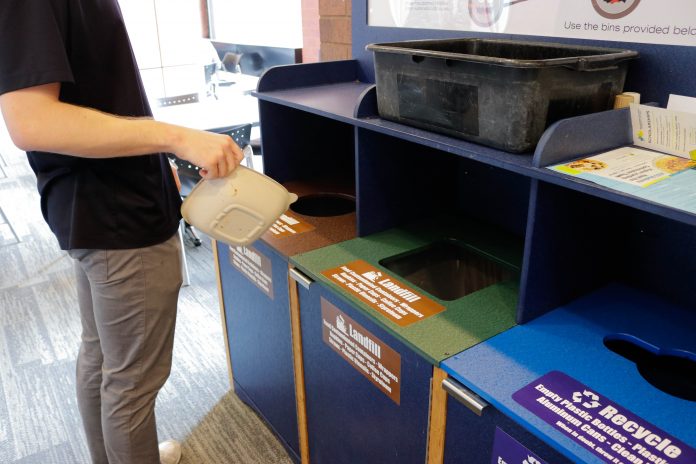Graham Murphy
Reporting corespondent
gmurphy6@jccc.edu
Current composting initiatives reach many areas of the college, ranging from collecting the paper towels in the bathrooms, to converting food waste generated in the kitchens into rich compost, which is put then to use in the farm.
However the college sustainability has, for the past semesters, had their sights set on an ambitious expansion of these efforts. They want to implement a system of post consumer composting. That means composting unfinished food waste and biodegradable materials that people normally throw away.
Nils Beverlin, student, said they believe keeping the student body informed on composting initiatives is integral to a smoothly flowing system.
“I changed all the lids out on the waste stations, to compensate for the composting paradigm,” Beverlin said.
Beverlin is referring to the green lids on some of the waste bins in COM, where the post-consumer composting is going to be implemented. The color was changed before the fact in an attempt to get students used to the new system.
According to a waste audit conducted in Spring 2017, roughly 55 percent of the content found in the landfill bins of the food court is compostable. This includes both food which is thrown away by consumers, as well as the biodegradable serveware found on campus.
Compostable waste which is sent to the landfill doesn’t actually biodegrade effectively. Instead, it rots on top of mounds of trash, putting the organic contents to waste and releasing methane, a potent greenhouse gas, into the atmosphere.
“Without a system of post consumer composting on campus, we aren’t actually increasing the diversion rate,” Beverlin said. “The whole point is to get it and turn it back into dirt.”
Post-consumer composting is the next big step in moving toward a more sustainable campus. However, there are some setbacks.
“Mostly what we have is a logistical issue,” said Recycling and Waste Minimization Coordinator, Krystal Anton. “There has not been an agreement as to whose job it’s going to be to move it from the bins to the dock, and then from the dock to where it needs to go.”
With the expansion of sustainable initiatives on campus, from managing compost, to sorting office materials, and even scrapping old hardware like light fixtures and computers, the interns are maxed out.
Sustainability on a college campus requires many different departments to work together, and old ways of moving materials are having to be rethought in order to bring the new system to life.
“We’re currently working on a materials management plan,” Anton said. “What we’re trying to figure out is who moves what, where, and how often.”
Anton said she hopes the outcome of this is a more efficient, campus wide-approach to waste management. If all goes smoothly, not only might this reduce costs to the college of labor involved in moving materials, but it would also reveal which departments have the workers and supplies available to move the post-consumer food waste.






















